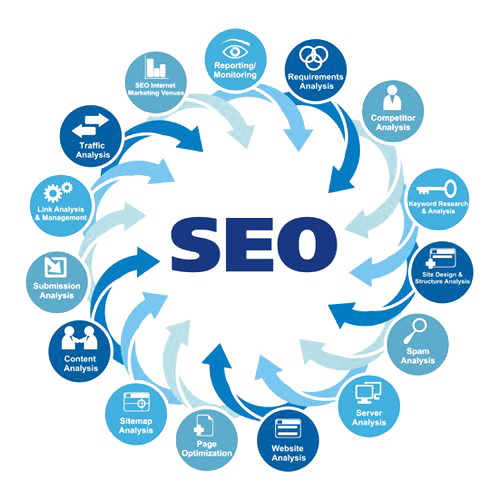
Imagine your website or blog is a house. The architecture, foundation, and wiring are all essential elements that often go unseen but significantly impact its overall performance.
In the world of online marketing technical SEO plays a similar role.
It’s the invisible infrastructure that ensures your website is accessible, user-friendly, and can be easily crawled and indexed by the search engine spiders.
In this blog post I would like to talk about the many benefits of executing technical SEO in your business and share with your a few technical SEO tips and tricks.
Lets get to it!
Benefits of Technical SEO
Technical SEO, a crucial component of your overall SEO strategy, focuses on optimizing the technical aspects of a website to improve its visibility and performance in search engine results pages (SERPs).
Here are some of the key benefits it offers:
Improved Search Engine Visibility
- Higher Rankings: A technically sound website is more likely to rank higher in search engine results for relevant keywords.
- Increased Organic Traffic: Higher rankings lead to more organic traffic, more leads and the ability to drive potential customers to your site.
- Enhanced Brand Awareness: Being able to rank high on the major search engines can boost brand awareness and reputation.
Better User Experience
- Faster Page Load Times: Technical optimizations can significantly improve website speed, leading to a better user experience and reduced bounce rates!
- Mobile-Friendliness: Ensuring a website is mobile-responsive is essential for today’s users. Technical SEO helps optimize for mobile devices.
- Improved Navigation: A well-structured and easy-to-navigate website/blog boosts user satisfaction and encourages them to explore further.
Enhanced Website Performance
- Reduced Technical Errors: Technical SEO helps identify and fix issues like broken links, duplicate content, and crawl errors.
- Improved Website Health: A healthy website is more likely to be indexed correctly by search engines and load efficiently.
- Enhanced Website Security: Technical SEO practices often include security measures to protect your website from vulnerabilities.
Cost-Effective SEO
- Long-Term Benefits: Technical SEO is a big part of SEO and can provide long-term benefits without requiring constant updates or significant ongoing costs.
- Efficient Resource Allocation: By addressing technical issues upfront, you can focus your SEO efforts on other areas, such as content creation and link building.
Technical SEO Tips & Tricks:
1. Website Structure and Architecture:
- URL Structure: Use clean, descriptive URLs that include relevant keywords.
- Sitemaps: Create XML sitemaps to make it easier for search engine spiders to crawl your website’s pages more efficiently.
- Internal Linking: Link to relevant pages within your website to improve navigation and on-page SEO.
2. Mobile-Friendliness:
- Responsive Design: Make sure your website looks and functions well on all devices.
- Mobile-Specific Issues: Check for common mobile SEO problems like slow load times and small font sizes.
3. Page Speed:
- Optimize Images: Compress images without sacrificing quality.
- Minimize Code: Reduce the amount of code on your pages.
- Leverage Caching: Store frequently accessed files locally to improve load times.
4. HTTPS:
- Security: Use HTTPS to encrypt data transmitted between your website and visitors.
- Search Engine Ranking: Google and the other search engines prioritize websites that have HTTPS .
5. Indexing:
- Robots.txt: Use a robots.txt file to control which pages search engines can crawl.
- Noindex Tag: Prevent specific pages from being indexed if necessary.
6. Technical SEO Tools:
- Google Search Console: Monitor your website’s performance in search results.
- Google Analytics: Track website traffic and user behavior.
- SEO Audit Tools: Use tools like SEMrush or Ahrefs to identify technical SEO issues.
7. Ongoing Optimization:
- Stay Updated: Keep up with the latest SEO trends and best practices.
- Monitor Performance: Regularly check your website’s search engine rankings and make adjustments as needed.
Additional Tips:
- Prioritize User Experience: Technical SEO should always be aligned with providing a great user experience.
- Mobile-First Indexing: Google primarily indexes websites based on their mobile versions.
- Core Web Vitals: Focus on improving metrics like Largest Contentful Paint (LCP), First Contentful Paint (FCP), and Cumulative Layout Shift (CLS).
Keep in mind that technical SEO is a complex field, and it’s often beneficial to consult with an SEO expert for in-depth guidance.
By following these basic guidelines, you can significantly improve your website’s visibility in search engine results!
Technical SEO Tools:
Here are some of my favorite technical SEO tools to help you improve your technical SEO.
Website Crawlers and Sitemaps
- Google Search Console – A free tool from Google that allows you to monitor your website’s performance in search results.
- Bing Webmaster Tools – Similar to Google Search Console, this tool is for monitoring your website’s performance in Bing search results.
- Screaming Frog SEO Spider – A popular paid tool that crawls your website and provides detailed information about technical SEO issues.
- Sitebulb – Another paid tool that offers comprehensive website audits and technical SEO insights.
HTML Validation and Testing
- W3C Markup Validation Service – A free online tool to validate HTML, CSS, and other web standards.
- Google PageSpeed Insights – Analyzes the performance of your website and provides recommendations for improvement.
- GTmetrix – Offers similar performance testing and optimization suggestions.
Backlink Analysis
- Ahrefs – A powerful paid tool for backlink analysis, keyword research, and competitor analysis.
- Moz – Another popular paid tool with similar features to Ahrefs.
- SEMrush – A versatile tool that offers backlink analysis, keyword research, and competitive analysis.
Mobile-Friendliness Testing
- Mobile Test Assistant – A Chrome extension for testing your website on different mobile devices.
Additional Tools
- Google Analytics – A free tool to track website traffic and user behavior.
- Yoast SEO – A popular WordPress plugin for optimizing your website for search engines.
- All in One SEO Pack -A nother popular WordPress plugin for SEO optimization.



